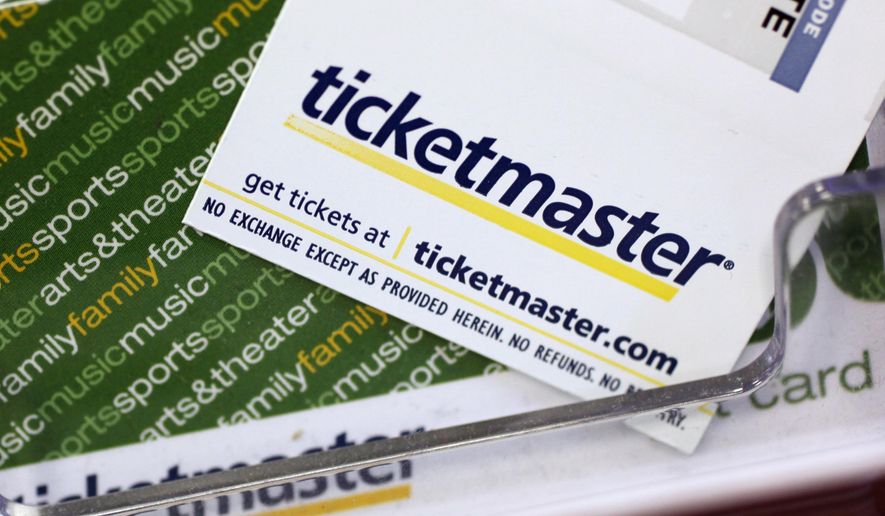People are fed up with Ticketmaster and its messing with Taylor Swift fans didn’t help, but the company’s president will tell Congress on Tuesday that he doesn’t deserve to be a punching bag for the entertainment industry.
In testimony before a Senate panel, Live Nation Entertainment President Joe Berchtold also plans to apologize to Ms. Swift and her legion of fans for botched ticket sales for her tour.
“We hear people say that ticketing markets are less competitive today than they were at the time of the Live Nation-Ticketmaster merger,” Mr. Berchtold will say, according to prepared remarks that Ticketmaster shared with The Washington Times. “That is simply not true.”
Still, lawmakers contend that his company has shirked customers’ complaints for more than a decade. Sen. Amy Klobuchar said the ticketing leader will not be able to shake it off this time.
“The issues within America’s ticketing industry were made painfully obvious when Ticketmaster’s website failed hundreds of thousands of fans hoping to purchase tickets for Taylor Swift’s new tour, but these problems are not new,” the Minnesota Democrat said in a statement announcing the hearing. “For too long, consumers have faced high fees, long waits, and website failures, and Ticketmaster’s dominant market position means the company faces inadequate pressure to innovate and improve.”
Ms. Klobuchar, who leads the Judiciary Committee’s antitrust panel, said everybody suffers when there is a lack of competition to incentivize fair pricing and better services and she plans to probe how consolidation has harmed customers and artists.
SEE ALSO: GOP keeps diversity and inclusion as priorities on House financial services committee
Ticketmaster merged with Live Nation in 2010, which led to Ticketmaster controlling an estimated 70% of the primary ticketing and live events market. Critics say the merger gave Ticketmaster the power to dictate high prices while delivering poor results for fans and entertainers.
In November 2022, millions of people joined a Ticketmaster presale for Ms. Swift’s Eras Tour, which led to long waits and system crashes. Amid the ensuing outrage, Ticketmaster canceled a general sale for the tour and apologized, while Ms. Swift said the drama “really pisses me off.”
Ms. Klobuchar then wrote a sternly worded letter to Ticketmaster’s leadership expressing longstanding skepticism about its business and questioning whether it has followed an antitrust consent decree governing the ticket company’s operations.
Ticketmaster argues that its industry is more competitive than ever, that it innovates more than any other ticket company, and it supports policymakers making changes such as banning speculative selling and deceptive sites while better enforcing existing laws and imposing new penalties.
Congress is digging into the company, and Ms. Klobuchar and her Democratic colleagues are not the only ones with questions. Republican antitrust anger has largely focused on Big Tech, but their targets appear to have spread and they are eager to take aim at Ticketmaster, too.
“American consumers deserve the benefit of competition in every market, from grocery chains to concert venues,” Sen. Mike Lee, Utah Republican, said in a statement. “I look forward to exercising our subcommittee’s oversight authority to ensure that anticompetitive mergers and exclusionary conduct are not crippling an entertainment industry already struggling to recover from pandemic lockdowns.”
The growing anger on Capitol Hill about Ticketmaster’s practices comes as the drama involving Ms. Swift increased the visibility of complaints against the ticket company.
Activists started a #BreakUpTicketmaster campaign in October 2022 and saw interest surge following the debacle affecting Ms. Swift’s fans. American Economic Liberties Project senior policy analyst Krista Brown said attention to her team’s anti-Ticketmaster campaign has spiked.
“I think we had roughly 10,000 signatures from no inciting incident, then with her we’ve grown to 100,000, from other things as well of course but there is certainly an appetite,” Ms. Brown said.
The disgruntled opponents of Ticketmaster are not limited to concertgoers and live events attendees but include entertainers as well. The teardrops on many artists’ guitars are caused by Ticketmaster, Ms. Brown said.
“I would say prior to Taylor Swift there was a frustration with the feeling that this conversation happens every couple of years where a brave artist will speak out about the inner workings of the industry and then very little will happen so hopefully that will change,” Ms. Brown said.
Precisely what, if anything, Congress may do is not clear. Sen. Lindsey Graham, the judiciary committee’s top Republican, appears to be keeping an open mind. The South Carolina Republican said he is looking forward to learning on Tuesday about what has happened and how to identify solutions.
Judiciary Committee Chairman Richard J. Durbin, Illinois Democrat, said the competition in the ticketing and live entertainment industries has deteriorated since Ticketmaster combined with Live Nation. He said he is eager to plot steps to restore competitiveness in a way that puts fans and artists first.
Priorities for the House’s top antitrust panel remain uncertain. Republicans have grabbed control of the chamber and whether Rep. Ken Buck, Colorado Republican, remains the top GOP lawmaker taking charge of the antitrust panel is undecided. Mr. Buck is a staunch critic of Big Tech who has previously partnered with Ms. Klobuchar on bipartisan antitrust legislation.
• This article is based in part on wire-service reports.
• Ryan Lovelace can be reached at rlovelace@washingtontimes.com.




Please read our comment policy before commenting.